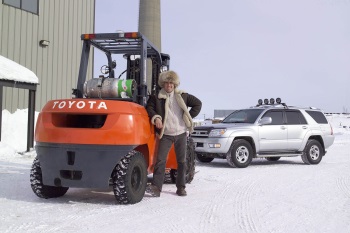Complete Powerpoint slide presentation for forklift instructors. Ready made training course
operating forklift trucks in winter conditions
 The article below was written by Trinton Castetter of Toyota Forklift Trucks and contains some useful hints and tips about using forklifts in winter conditions.
The article below was written by Trinton Castetter of Toyota Forklift Trucks and contains some useful hints and tips about using forklifts in winter conditions.
Winter is coming and it's time to prepare yourself (if you’re an operator), associates (if you’re a supervisor), facility, and forklifts for the harsh weather conditions ahead. Winterizing your fleet and facilities is no small task and it can have serious long-term impact if you don’t take the right forklift weather protection steps before snow piles up. So where to start? There are several areas of an operation to consider as the cold arrives.
Forklift Weather Protection in your Facility
This one’s pretty obvious, but if your operation involves working outside, then the wintery conditions are going to affect you significantly. Whether it’s freezing rain, snow, or anything in between, you need to have procedures in place for how and when it is appropriate to work in these types of environments.
What types of hazards does this present for your application? Do you have ramps or pathways that could be particularly icy or dangerous to traverse? Is there danger of your product being damaged if exposed to these elements? What effect does the weather have on your visibility? Forklift weather protection is all about understanding the severity of the weather and its impact to your entire operation; that’s key to proper decision making. Make sure to never operate a forklift in any dangerous conditions and to only travel as fast as the conditions will allow.
Forklift Weather Protection for Employees
The safety of all associates is paramount. This starts with making sure operators and pedestrians are dressed appropriately for the weather by wearing extra layers and covering up their extremities as needed. If you’re an operator, make sure you take responsibility and let your supervisor know your needs. Gloves, coats, socks, boots, and ear muffs are but a few additional items to consider. When visibility is adversely affected by the weather, it’s also a good idea to wear high visibility clothing such as safety vests to help ensure high visibility. However, remember that safety is the most important thing here. Any additional clothing or gear operators wear should not impair their ability to perceive their environment (e.g. hearing or sight restrictions) or operating ability (e.g. limited mobility or ability to operate controls)
We talked about setting procedures for how to handle cold weather conditions, but it’s just as important to keep your employees informed of these procedures. Hosting daily meetings before each shift to evaluate current and expected weather conditions is a useful practice. This helps to ensure that everyone is on the same page prior to beginning their work day and allows you to develop a forklift weather protection action plan catered to the specific conditions for that day. It can also help you to reinforce good pre-operation checks. Having proper fluid levels, tire conditions, and other standards satisfied will help your operators stay safe during this time of year. If you’re an operator, this is definitely a process worth bringing up to your manager.
Forklift Weather Protection for your Forklifts
Does your forklift have an enclosed operator compartment and a heater/defroster? If you’re operating outdoors, and as long as the compartment doesn’t hinder perception of the working environment (fog glass, inability to hear, etc.), features like these can go a long way to keep operators warm, comfortable, and productive. It can also help make sure the operator controls and seats stay in top working condition. What about cold start aids such as engine block heaters and coolant preheaters? Are you using batteries that are designed to work or be charged in cold conditions? If you can’t even get your forklift started, you’re not going to get very much work done.
Even if your forklift is properly equipped, you still need to properly maintain it to keep it up and running throughout the winter. This starts with scheduling preventative maintenance prior to the start of cold weather and having regularly scheduled maintenance throughout the year. Proper battery care and maintenance is equally as important. Maintaining proper water levels and limiting exposure to cold weather as much as possible are two general rules of thumb for electric forklifts. Cold weather can greatly reduce battery life and battery run time so you should prepare for how this might affect your productivity ahead of time. Consider your battery charging options and number of batteries on-hand to help reduce potential downtime.
Disclaimer. The legislative information contained on this web site is my interpretation of the law based on many years in the health and safety business. A definitive interpretation can only be given by the courts. I will therefore not be held responsible for any accident/incident/prosecution arising as a consequence of anyone using any information obtained from this web site.